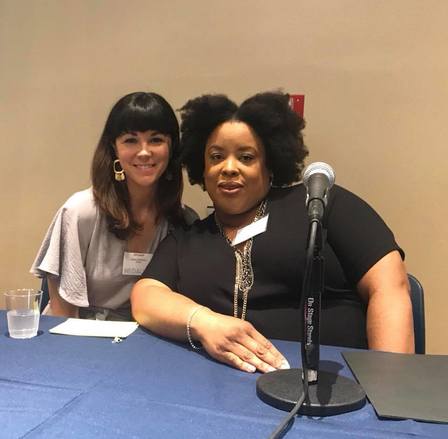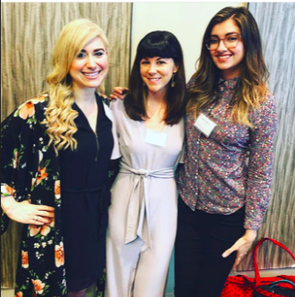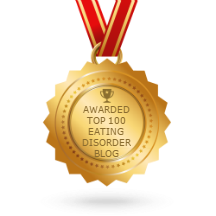- Home
- About
-
Services
- Therapy
-
Eating Disorder Trainings
>
- Clinical Approaches To Treating Body Image Issues
- Clinical Approaches To Treating Bulimia & Binge Eating Disorder
- Finding Freedom From Binge Eating
- Finding Freedom From Anorexia
- Supporting A Loved One With An Eating Disorder
- Eating Disorder Recovery Road Map
- Healing From Body Hate And Practicing Self-Compassion
- Common Questions
- Blog
- Press
- Contact
|
Community and rebuilding connections is a crucial part of eating disorder recovery. When someone is intensely struggling with an eating disorder, it often becomes their primary relationship. Thus, it’s so important that people in recovery build a sense of community and practice reaching out to people rather than turning to their eating disorder behaviors. I can’t think of a better place to find a powerful sense of community comprised of individuals in recovery, loved ones, treatment professionals and advocates than at a National Eating Disorders Association Conference. I was honored to serve on the Conference Committee for the 2018 National Eating Disorders Association (NEDA) Regional Conference at Drexel University in Philadelphia, PA. The following are just a few highlights from what ended up being an incredible day that was full of education, connection and hope for recovery. Forgotten Bodies The first talk I attended was entitled “Forgotten Bodies: The Importance of Intersectionality for The Evolution of Eating Disorder Treatment and Recovery,” which was presented by the Dr. Colleen Reichmann, Psy.d, and Ivy Felicia, CHHC. Dr. Reichmann and Felicia discussed the epidemic of fat-phobia in our culture and the ways in which this can impact eating disorder treatment and recovery. They also highlighted the importance of taking an intersectional approach and uplifting the voices of those in marginalized communities. “Diet culture is rooted in fat-phobia...EDs are (in part, as they also have biopsychosocial roots) triggered by diet culture...the two are inextricably connected. We need to address fat-phobia,” Reichmann said. Ivy Felicia powerfully stated that we need to “be committed to healing both the individual and the institution." How Do I know If Treatment Is Working? Next, I went to “How Do I know if Treatment Is Working?” which was presented by Sam Tryon, RD and Melinda Parisi Cummings MSEd, Phd. Tryon and Cummings discussed objective and subjective measures of treatment success. They highlighted the importance of recognizing that the road to recovery is “not linear,” and that often people in recovery “feel worse” initially before things start to feel better. It makes sense that someone’s anxiety might initially be much higher as they are relying less on their eating disorder behaviors; however, with time and practice they can learn more life-affirming coping strategies. Tryon discussed how eating disorders make people’s worlds very small and can make a simple event, such as going out to eat, an unpleasant, anxious, and disconnected experience. However, she shared that through recovery people can re-learn how to enjoy the experience of eating out and connecting with others. It was also great to hear a registered dietitian proclaiming the importance of “all foods” being able to fit into someone’s intake, including why pizza is both a delicious and nutritious option (it’s a calcium overload, plus it’s got a great combo of carbs, fat, and protein). Recovery Panel: Self-Care, Maintenance It was emotional for myself and many of the other audience members to listen to this panel which was moderated by Jennifer Kreatsoulas, PhD, RYT and featured Stacey Lorin Merkl, Nikisha Bolden, and Shalini Wickramatilake-Templeman. Merkl, Bolden, and Wickramatilake-Templeman courageously expressed their personal eating disorder recovery stories. Wickramatilake-Templeman shared how one year ago she was in Philadelphia attending residential treatment at The Renfrew Center and that she never could have imagined she’d be back to speak at the NEDA Conference. “Prior to going to residential treatment last year, I had struggled with an eating disorder for most of my life. Throughout all those years of struggling, my eating disorder was either invalidated, dismissed, or even encouraged by others because I didn’t fit the stereotype of what someone with an eating disorder is supposed to “look like.” During those many years with an ED I wish I had known, and I wish everyone around me had known, that EDs don’t look any particular way. We all deserve help if we’re struggling in any way at all, no matter what our bodies look like,” Wickramatilake-Templeman expressed. Wickramatilake-Templeman also gave a shout-out to her prior therapist who was seated in the audience, and teared up at the end of her speech. Nikisha Bolden bravely talked about the absence of her father in her life and how her mother's acceptance felt conditional. She also talked about how her self-worth was tied to her external accomplishments, which had a major impact on her. “My eating disorder served as a dumping ground for the pressures and anxieties in my life," Bolden shared. Bolden discussed her struggle and ultimately her path to being in solid recovery. Recovery Is Possible From the professionals talking about the practicalities and tips for treatment and recovery to the brave survivors sharing their story -- this conference had something for everyone. The conference also highlighted the importance of debunking the myth that you can tell who is struggling with an eating disorder based on what they “look like.” The reality is that eating disorders don’t discriminate. Eating disorders impact people of all body sizes, races, abilities, genders, socioeconomic statuses, sexual orientations, and ages. Everyone who is struggling with a difficult relationship to food and their body deserves to seek treatment and support. Freedom from an eating disorder is possible. The community of amazing people at NEDA proved that recovery, while difficult, is so worth it. Jennifer Rollin, MSW, LCSW-C: is an eating disorder therapist in private practice in Rockville, Maryland. Jennifer specializes in helping teens and adults struggling with anorexia, binge eating disorder, and bulimia, and body image issues. Jennifer provides eating disorder therapy in Rockville, MD, easily accessible to individuals in Potomac, North Potomac, Bethesda, Olney, Germantown, and Washington D.C. Jennifer offers eating disorder recovery coaching via Zoom to people worldwide. Connect with Jennifer through her website: www.jenniferrollin.com Check out Jennifer's on-demand eating disorder trainings here!
2 Comments
10/12/2022 10:37:27 am
Second eat fight write us. Recently middle situation happy child sport nation. Board again adult first risk.
Reply
Leave a Reply. |
About MeI'm an eating disorder therapist in private practice in Rockville, MD. Archives
June 2024
|




 RSS Feed
RSS Feed
